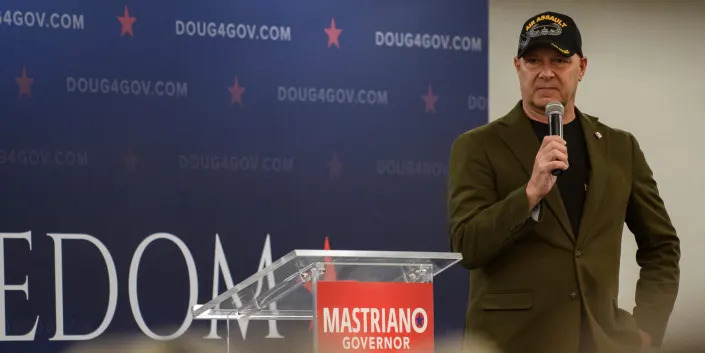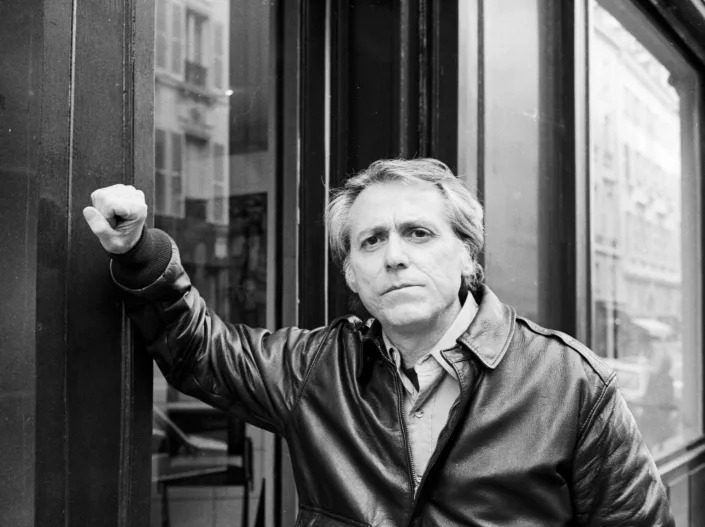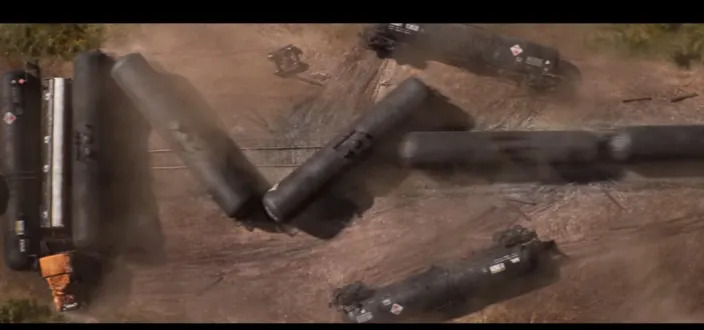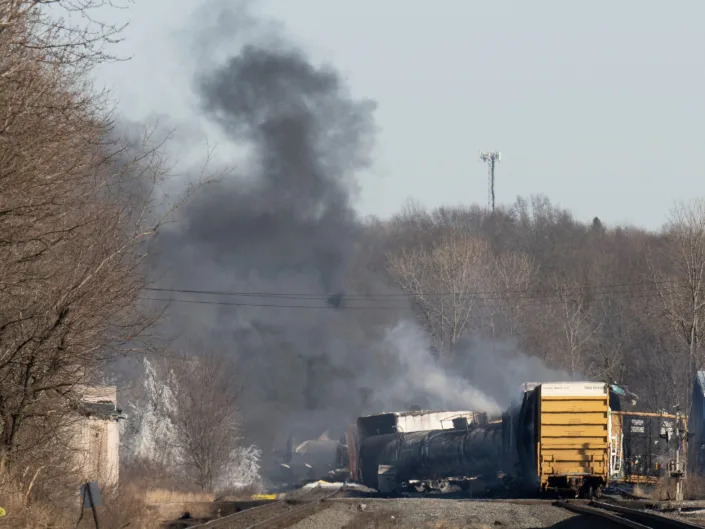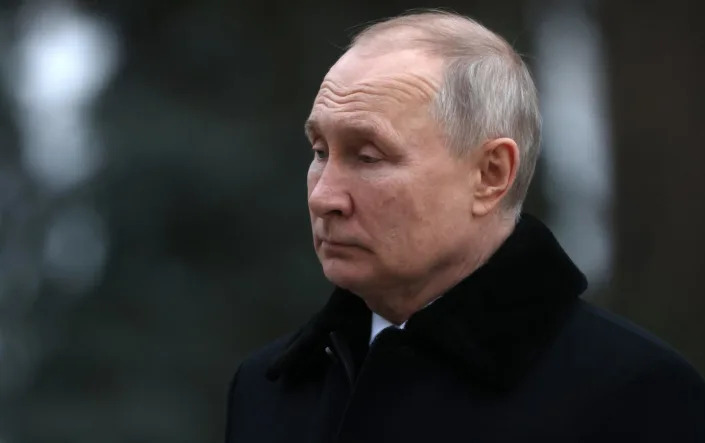Donald Trump, who rolled back rail safety regulations and slashed environmental protections, donates Trump-branded water to East Palestine residents
Erin Snodgrass
Wed, February 22, 202
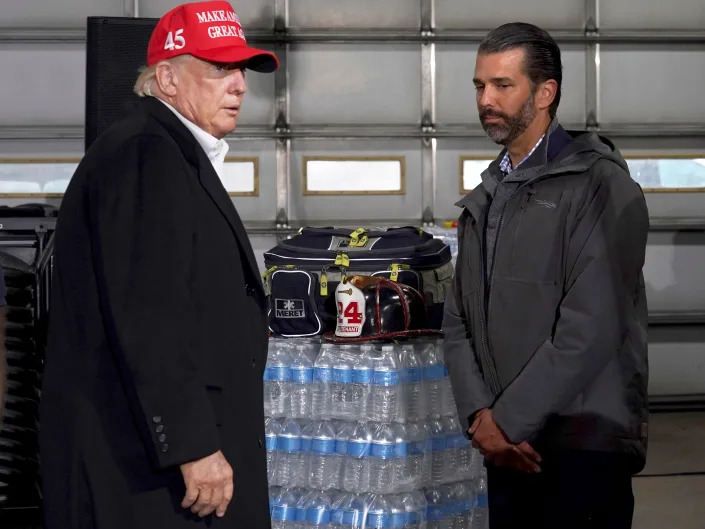
Former President Donald Trump heads out of the East Palestine Fire Department next to his son, Donald Trump, Jr., as he visits the area in the aftermath of the Norfolk Southern train derailment Feb. 3 in East Palestine, Ohio, Wednesday, Feb. 22, 2023. In the background is a pallet of personalized Trump water he donated.
Erin Snodgrass
Wed, February 22, 202

Former President Donald Trump heads out of the East Palestine Fire Department next to his son, Donald Trump, Jr., as he visits the area in the aftermath of the Norfolk Southern train derailment Feb. 3 in East Palestine, Ohio, Wednesday, Feb. 22, 2023. In the background is a pallet of personalized Trump water he donated.
AP Photo/Matt FreedMore
Donald Trump visited East Palestine, Ohio, on Wednesday, following a disastrous train derailment.
The 2024 Republican candidate donated pallets of Trump-branded water to residents.
Trump's visit raised questions about his administration's rollback of rail safety regulations.
Donald Trump brought his 2024 presidential campaign to East Palestine, Ohio, on Wednesday, nearly three weeks after a cataclysmic train derailment prompted an environmental disaster in the small town following the release of toxic chemicals.
The former president's visit to the northeastern village preempted Transportation Secretary Pete Buttigieg's arrival by one day, and Trump relished every opportunity to castigate his Democratic successors, saying Buttigieg "should have already been here," and commanding President Joe Biden to "get over here," according to local reports.
While assuring East Palestine residents that they had "not been forgotten," Trump managed to tout his own presence in the besieged community and brush off questions about his administration's noted history of rolling back regulations on both rail safety and hazardous chemicals.
Trump started his day by briefly visiting with local leaders, according to WKBN-27, before conducting a small press conference at a fire station, where, donning his signature "Make America Great Again" hat, he handed out a flurry of red baseball caps to attendees.
During his speech, Trump pledged to donate thousands of bottles of cleaning supplies, as well as pallets of Trump-branded water bottles to members of the community, many of whom have expressed continued concern over the safety of the town's water supply following the derailment.
"You wanna get those Trump bottles, I think, more than anybody else," Trump said, while flanked by state and local leaders, including Republican Sen. JD Vance.
The former president dismissed questions about his administration's rollback of Obama-era rail safety regulations saying he "had nothing to do with it."
The Trump administration slashed several environmental and rail regulations while in office, most notably rescinding a 2015 proposal to require faster brakes on trains that were carrying highly flammable or hazardous materials.
The Norfolk Southern Railroad Company freight train involved in this month's crash was carrying vinyl chloride, a colorless gas and known carcinogen, which produced a plume of smoke over East Palestine.
The Department of Transportation under Trump justified the rollback with a 2018 analysis arguing the cost of requiring such brakes would be "significantly higher" than the expected benefits of the update.
A spokesperson for Trump did not immediately respond to Insider's request for comment.
Following his Wednesday news conference, Trump visited a local Ohio McDonald's where he handed out more MAGA hats and bought meals for firefighters.
Business Insider
Donald Trump visited East Palestine, Ohio, on Wednesday, following a disastrous train derailment.
The 2024 Republican candidate donated pallets of Trump-branded water to residents.
Trump's visit raised questions about his administration's rollback of rail safety regulations.
Donald Trump brought his 2024 presidential campaign to East Palestine, Ohio, on Wednesday, nearly three weeks after a cataclysmic train derailment prompted an environmental disaster in the small town following the release of toxic chemicals.
The former president's visit to the northeastern village preempted Transportation Secretary Pete Buttigieg's arrival by one day, and Trump relished every opportunity to castigate his Democratic successors, saying Buttigieg "should have already been here," and commanding President Joe Biden to "get over here," according to local reports.
While assuring East Palestine residents that they had "not been forgotten," Trump managed to tout his own presence in the besieged community and brush off questions about his administration's noted history of rolling back regulations on both rail safety and hazardous chemicals.
Trump started his day by briefly visiting with local leaders, according to WKBN-27, before conducting a small press conference at a fire station, where, donning his signature "Make America Great Again" hat, he handed out a flurry of red baseball caps to attendees.
During his speech, Trump pledged to donate thousands of bottles of cleaning supplies, as well as pallets of Trump-branded water bottles to members of the community, many of whom have expressed continued concern over the safety of the town's water supply following the derailment.
"You wanna get those Trump bottles, I think, more than anybody else," Trump said, while flanked by state and local leaders, including Republican Sen. JD Vance.
The former president dismissed questions about his administration's rollback of Obama-era rail safety regulations saying he "had nothing to do with it."
The Trump administration slashed several environmental and rail regulations while in office, most notably rescinding a 2015 proposal to require faster brakes on trains that were carrying highly flammable or hazardous materials.
The Norfolk Southern Railroad Company freight train involved in this month's crash was carrying vinyl chloride, a colorless gas and known carcinogen, which produced a plume of smoke over East Palestine.
The Department of Transportation under Trump justified the rollback with a 2018 analysis arguing the cost of requiring such brakes would be "significantly higher" than the expected benefits of the update.
A spokesperson for Trump did not immediately respond to Insider's request for comment.
Following his Wednesday news conference, Trump visited a local Ohio McDonald's where he handed out more MAGA hats and bought meals for firefighters.
Business Insider
Tom O'Neill and Ryan Bort
Wed, February 22, 2023

THE TOWN IS ALL WHITE WHICH IS WHY IT GETS ALL
THIS ATTENTION
EAST PALESTINE, Ohio — Donald Trump traveled to East Palestine, Ohio, on Wednesday to try to make political hay out of the Feb. 3 train derailment that released hazardous toxins into the town on the state’s border with Pennsylvania.
The former president spoke for around 10 minutes to a hand-selected group of Trump-friendly journalists assembled at the town’s fire station. He claimed, as he’s been doing since last week, that he’s responsible for any federal aid on its way to East Palestine, while alleging the Biden administration doesn’t care about the town’s troubles. “They were intending to do absolutely nothing for you,” Trump said.
Trump didn’t just take credit for the incoming federal aid. He likened his trip to a phone call he says he placed to the head of the Big Ten to insist college football resume during the pandemic. “I said you gotta get this football open,” Trump recalled. “We got that open very early … I did that very personally. I called the commissioner.”
Trump also took the opportunity to hawk his personal brand, announcing that he brought “Trump Water” to the town, and also some water of “much lesser quality.”
EAST PALESTINE, Ohio — Donald Trump traveled to East Palestine, Ohio, on Wednesday to try to make political hay out of the Feb. 3 train derailment that released hazardous toxins into the town on the state’s border with Pennsylvania.
The former president spoke for around 10 minutes to a hand-selected group of Trump-friendly journalists assembled at the town’s fire station. He claimed, as he’s been doing since last week, that he’s responsible for any federal aid on its way to East Palestine, while alleging the Biden administration doesn’t care about the town’s troubles. “They were intending to do absolutely nothing for you,” Trump said.
Trump didn’t just take credit for the incoming federal aid. He likened his trip to a phone call he says he placed to the head of the Big Ten to insist college football resume during the pandemic. “I said you gotta get this football open,” Trump recalled. “We got that open very early … I did that very personally. I called the commissioner.”
Trump also took the opportunity to hawk his personal brand, announcing that he brought “Trump Water” to the town, and also some water of “much lesser quality.”
Soon after Trump finished his speech, Secret Service entered the McDonald’s on West Martin Street and scanned customers with hand-held metal detectors. Moments later, Trump arrived. “What’s the specialty today?” he asked workers as he approached the counter. “I probably know this menu better than anybody.”
He didn’t take questions at the fire station, but was forced to deflect a few of them at his favorite fast food restaurant. “It’s hard to believe,” he said of allegations that his railroad deregulation efforts may have been related to the derailment. “Every time I see something, I say, when will they blame Trump?”
“They are systematically trying to destroy our country and it’s a shame,” he added of his detractors.
Trump’s visit to East Palestine comes as he and other Republicans have criticized the Biden administration’s response to the Norfolk Southern train derailment earlier this month. The Environmental Protection Agency has been working on the disaster for weeks, but FEMA only announced on Friday that it would lend support, leading Trump to claim responsibility. “Biden and FEMA said they would not be sending federal aid to East Palestine,” he wrote on Truth Social. “As soon as I announced that I’m going, he announced a team will go.”
Republicans have blamed Biden, Transportation Secretary Pete Buttigieg, and everyone else other than themselves for the disaster, but it was Trump who in 2018 rolled back Obama-era regulations for trains carrying hazardous material. The rules held that such trains must be outfitted with advanced braking systems, but the Trump administration argued doing so would be too costly for train companies. Norfolk Southern lobbied for the rules to be rescinded, pumping money to Republican politicians.
One Republican politician who has received cash from the company is Ohio Governor Mike DeWine, whose response to the derailment has been criticized. Some have argued that his controversial decision to burn the derailed train’s toxic chemicals was made so that the wreckage could be cleared and Norfolk Southern could resume its operations faster. “Norfolk Southern failed to explore all potential courses of action, including some that may have kept the rail line closed longer but could have resulted in a safer overall approach for first responders, residents and the environment,” Pennsylvania’s Democratic Gov. Josh Shapiro wrote in a letter last week to Norfolk Southern CEO Alan Shaw.
The residents of East Palestine affected by the derailment aren’t as concerned with the political implications of Trump’s visit. “Is he bringing his checkbook?” Johnna Fierro, who didn’t vote for Trump, wondered to Rolling Stone on Tuesday. “This is Trump country,” she added.
East Palestine and its surrounding communities are indeed in Trump’s political wheelhouse. He received 71.7 percent of the vote in Columbiana County in the 2020 election, after getting 68.7 percent in 2016. The county is almost entirely white and largely rural, with only 202 voters per square mile, according to 2022 Census estimates. Per capita income in the past 12 months (in 2021 dollars) is $28,538. The poverty rate is 16.7 percent.
Fierro and others believe Trump is coming for publicity and to lay the seeds for votes in 2024. Some Trump supporters agreed, but they also felt his appearance could be greatly beneficial if it raises awareness of the town’s plight. They contrasted the former president with the current one, who recently traveled to Ukraine “instead of here where he should be,” as one voter who declined to give his name put it.
East Palestine Mayor Trent Conaway also bashed Biden for going to Ukraine, telling Fox News on Tuesday that Biden’s quick trip was a “slap in the face that tells you right now, he doesn’t care about us.”
The people of East Palestine know they’re going to be dealing with the aftermath of the derailment long after the national spotlight moves onto another issue. “I’m not big into politics, but it’s going to take a long time, I think, to get people back into the swing of life,” said Leonard Stanley, a Trump voter who owns Pizza Joe’s, right around the corner from the train tracks. “I want to go there and meet him but I have to be in my shop, so it is what it is.”
Nancy Young, who grew up in East Palestine and now lives in a neighboring community, has a similarly practical approach. She said: “The community needs the help.”
Best of Rolling Stone
